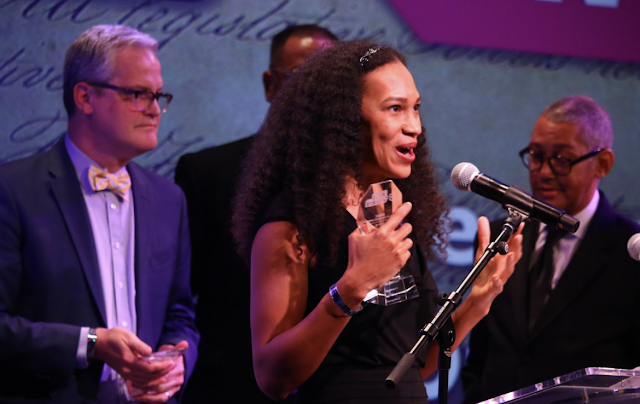The Grand Trifecta: Isaac Julien, Cheryl Dunye, and Nneka Onuorah
Two iconic filmmakers were honored recently in New York City, and a fresh young talent presented a screening of her award-winning documentary at a packed New York night club.
Last month My partner April and I were invited to attend "The James R. Brudner '83 Memorial Prize Lecture with Isaac Julien," organized by the Yale University LGBT Studies Program. The VIP reception and lecture took place at the Times Square offices of Skadden, Arps, Slate, Meagher & Flom LLP, where Isaac was interviewed and asked to reflect on his successful career as a black, queer filmmaker. We were treated to clips from his most celebrated films including Looking for Langston, Young Soul Rebels, and Frantz Fanon: Black Skin, White Masks.
 |
| Isaac Julien and Nina Kennedy |
I had originally met Isaac in Vienna where he was part of a panel discussion on his film The Long Road to Mazatlan. Both of us were many years younger and several pounds lighter, but we both knew a lifetime connection had been made. At last month's event April and I were also privileged to meet the Chairwoman of the Yale African American Studies Department Jacqueline Goldsby, who requested information on my documentary film on the Fisk Jubilee Singers to be included in the Yale curriculum.
A few weeks later we were invited to a special 20th-anniversary screening of Cheryl Dunye's The Watermelon Woman, an epic narrative detailing Cheryl's search for a fictional character, a Hollywood film actress of the 1930s.
 |
| Cheryl Dunye |
(BTW: I was also present at the New York premiere of this film 20 years ago. What a party that was!)
 |
| April Gibson, Cheryl Dunye, and Nina Kennedy |
Finally, we attended a special screening of Nneka Onuorah's award-winning documentary The Same Difference at the nightclub SlateNY in Manhattan. In honor of National Coming-Out Day, this after-work screening preceded the national broadcast of the film on Centric TV. Nneka describes the film as "....[an exploration of] homophobia and gender discrimination within the African-American lesbian community." The documentary primarily consists of interviews with self-defined "butch" lesbians including TV stars Lea Delaria (Orange is the New Black), AzMarie Livingston (Empire), and Felicia "Snoop" Pearson (The Wire). There are also self-defined "femmes," who describe the expectations placed upon them because of their appearance. Before the screening began we were treated to a full-on dance party with beats spun by DJs RiMix and Mary Mac. The cocktails flowed!
 |
| Nneka Onuorah |
We are so proud of our little young'un and look forward to enjoying many more of her films! Later, April pointed out that the timing of these films/events represented a grand trifecta. "What do you mean?", I asked.
 |
| Nneka Onuorah and Nina Kennedy |
She thought it was quite interesting that I met both Julien and Dunye twenty years ago and I was seeing them again within weeks of each other. Exactly twenty years ago, the United States President Bill Clinton signed the Defense of Marriage Act (DOMA) into law. DOMA allowed individual states to refuse to recognize same-sex marriages performed in other jurisdictions and created federal definitions for the terms "marriage" and "spouse." Same-sex marriage has been legal nationwide since June 26, 2015 when the United States Supreme Court ruled in Obergefell v. Hodges that state-level bans on same-sex marriage are unconstitutional. The court ruled that the denial of marriage licenses to same-sex couples and the refusal to recognize those marriages performed in other jurisdictions violates the Due Process and the Equal Protection clauses of the Fourteenth Amendment of the United States Constitution.
Fast forward twenty years later to 2016 and we have made great progress for LGBTQ rights. The White House Office of Personnel Management revised the definition of spouse in its Family and Medical Leave Act (FMLA) regulations to permit Federal employees with same-sex spouses to use FMLA leave in the same manner as Federal employees with opposite-sex spouses; the Department of Health and Human Services (HHS) Office for Civil Rights implemented a regulation that provides explicit protections from discrimination on the basis of sex stereotyping—including for lesbian, gay, and bisexual people—and gender identity in healthcare and insurance under the provisions of Section 1557 of the Affordable Care Act (ACA); the Pentagon lifted their ban on transgender people serving openly in the U.S. military; and the U.S. Equal Employment Opportunity Commission (EEOC) ruled that discrimination based on transgender status is sex discrimination in violation of Title VII of the Civil Rights Act of 1964.
Fast forward twenty years from now and there is no limit to the progress that we will see. The state of Vermont passed a bill banning the use of conversion therapy on the basis of sexual orientation and gender identity. Certainly more states will follow.
"So you see, Nina," April goes on to say, "This week we experienced the grand trifecta - three amazing filmmakers whose collective works represent the many facets of the LGBTQ community."






Comments
Post a Comment